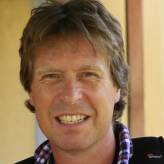
Dr Lionel Dumont
Medical Director
part time 20%
Geneva
Dr Lionel Dumont, you are an experimented doctor in anaesthesia, can you detail us briefly your life course ?
I studied Medicine and specialized in anaesthesia at the University Libre of Brussels in Belgium. Attracted by the mountains, I came to Geneva in 1996 when I joined the department of anaesthesia of the University hospital of Geneva.
At first, I planned to spend one year there … Here I am still here! For two decades, I have shared my time between the University Hospital Geneva and a private hospital of Savoie (france). Those two environment give me the opportunity to keep clinical expertise while being in contact with teaching and research. In 2008, the Swiss Cooperation asked me to participate in a training project for the volunteers of the Lebanese red cross. Then I started anaesthesia training projects in Liberia and taught rescue teams in India.
You are invested in humanitarian projects in Liberia. You therefore know Africa quite well. Why are you so related to this continent and what are the objectives of your field missions?
The course of the world saw my mother to be born in Congo. Since I am young, I have been hearing stories about Africa. Curiosity drove me to this continent at an early stage in my life and I had great pleasure to launch this training project in anaesthesia in Liberia with the SDC. For the last six years we have set up a concept of anaesthesia in context with limited resources based on the teaching of simple techniques allowing use of anaesthesia in good security conditions.
The project is currently developing at the national level under the aegis of the Ministry of Health. The medical literature demonstrates that anaesthesia can be extremely dangerous in numerous countries of Africa essentially due to lack of training and experience in the domain.
It thus seems natural to want to improve these conditions. The missions with 2nd Chance are a magnificent opportunity to secure not only the teaching about anaesthesia during for reconstructive surgery but also to work with local teams on the medical challenges during operations in Africa.
After two missions in Burundi and in Dar es Salaam, you agreed to join the operational direction of the Association 2nd Chance, how do you see your role?
I would say that we can always need an anaesthesiologist when we want to operate a patient …
The training programs developed by 2nd Chance in reconstructive surgery are exceptional as they target specific skills for African surgeons. This can only be planned in a serene environment allowing for patients’ safety assured by an anaesthetic team adapted to the situation.
This is the exact role of the anaesthetists committed in working side by side with 2nd Chance surgeons. They are integrated into the local team, to share, to discuss with African colleagues as well as to exchange knowledge and medical peculiarities during peri-operative time related to reconstructive surgery.
This cooperation and this teamwork are in my opinion the real assets of 2nd Chance in developing skills in Africa.




